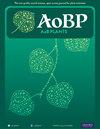Chlorophyll fluorescence characteristics and H2O2 contents of Chinese tallow tree are dependent on population origin, nutrients and salinity
IF 2.4
3区 生物学
Q2 ECOLOGY
引用次数: 0
Abstract
Plants from invasive populations often have higher growth rates than conspecifics from native populations due to better environmental adaptability. However, the roles of improved chlorophyll fluorescence or antioxidant defenses in helping them to grow better under adverse situations are insufficient, even though this is a key physiological question for elucidating mechanisms of plant invasion. Here, we conducted experiments with eight native (China) and eight introduced (US) populations of Chinese tallow tree (Triadica sebifera). We tested how salinity, nutrients (overall amount or N:P in two separate experiments) and their interaction affected T. sebifera aboveground biomass, leaf area, chlorophyll fluorescence and antioxidant defenses. Plants from introduced populations were larger than those from native populations but salinity and nutrient shortage (low nutrients or high N:P) reduced this advantage, possibly reflecting differences in chlorophyll fluorescence based on their higher PSII maximum photochemical efficiency (Fv/Fm) and PSI maximum photo-oxidizsable P700 in higher nutrient conditions. Native population plants had lower Fv/Fm with saline. Except in high nutrients/ N:P with salinity, introduced population plants had lower electron transfer rate and photochemical quantum yield. There were no differences in antioxidant defenses between introduced and native populations except accumulation of hydrogen peroxide (H2O2) which was lower for introduced populations. Low nutrients, high N:P or salinity increased total antioxidant capacity and H2O2. Our results indicate that nutrients and salinity induce differences in H2O2 contents and chlorophyll fluorescence characteristics between introduced and native populations of an invasive plant, illuminating adaptive mechanisms using photosynthetic physiological descriptors in order to predict invasions.乌桕的叶绿素荧光特征和 H2O2 含量与种群来源、养分和盐度有关
入侵种群的植物由于对环境有更好的适应性,其生长率往往高于本地种群的同种植物。然而,叶绿素荧光或抗氧化防御能力的提高在帮助它们在不利环境下更好地生长方面所起的作用尚不充分,尽管这是阐明植物入侵机制的一个关键生理问题。在这里,我们对中国乌桕(Triadica sebifera)的八个原生种(中国)和八个引进种(美国)进行了实验。我们测试了盐度、养分(两个独立实验中的总量或氮:磷)及其相互作用如何影响乌桕的地上生物量、叶面积、叶绿素荧光和抗氧化防御能力。引入种群的植株比本地种群的植株大,但盐度和养分短缺(低养分或高氮磷比)降低了这一优势,这可能反映了叶绿素荧光的差异,因为在高养分条件下,引入种群的植株具有更高的 PSII 最大光化学效率(Fv/Fm)和 PSI 最大光氧化能力 P700。原生种群植物在盐碱条件下的 Fv/Fm 较低。除了在高养分/氮磷比和盐度条件下,引种植株的电子传递速率和光化量子产率都较低。引入种群和本地种群的抗氧化防御能力没有差异,但引入种群的过氧化氢(H2O2)积累较低。低养分、高氮磷比或盐度会增加总抗氧化能力和 H2O2。我们的研究结果表明,养分和盐度会导致入侵植物的引入种群和本地种群之间在 H2O2 含量和叶绿素荧光特性上的差异,从而揭示了利用光合生理描述因子预测入侵的适应机制。
本文章由计算机程序翻译,如有差异,请以英文原文为准。
求助全文
约1分钟内获得全文
求助全文
来源期刊

AoB Plants
PLANT SCIENCES-
CiteScore
4.80
自引率
0.00%
发文量
54
审稿时长
20 weeks
期刊介绍:
AoB PLANTS is an open-access, online journal that has been publishing peer-reviewed articles since 2010, with an emphasis on all aspects of environmental and evolutionary plant biology. Published by Oxford University Press, this journal is dedicated to rapid publication of research articles, reviews, commentaries and short communications. The taxonomic scope of the journal spans the full gamut of vascular and non-vascular plants, as well as other taxa that impact these organisms. AoB PLANTS provides a fast-track pathway for publishing high-quality research in an open-access environment, where papers are available online to anyone, anywhere free of charge.
 求助内容:
求助内容: 应助结果提醒方式:
应助结果提醒方式:


